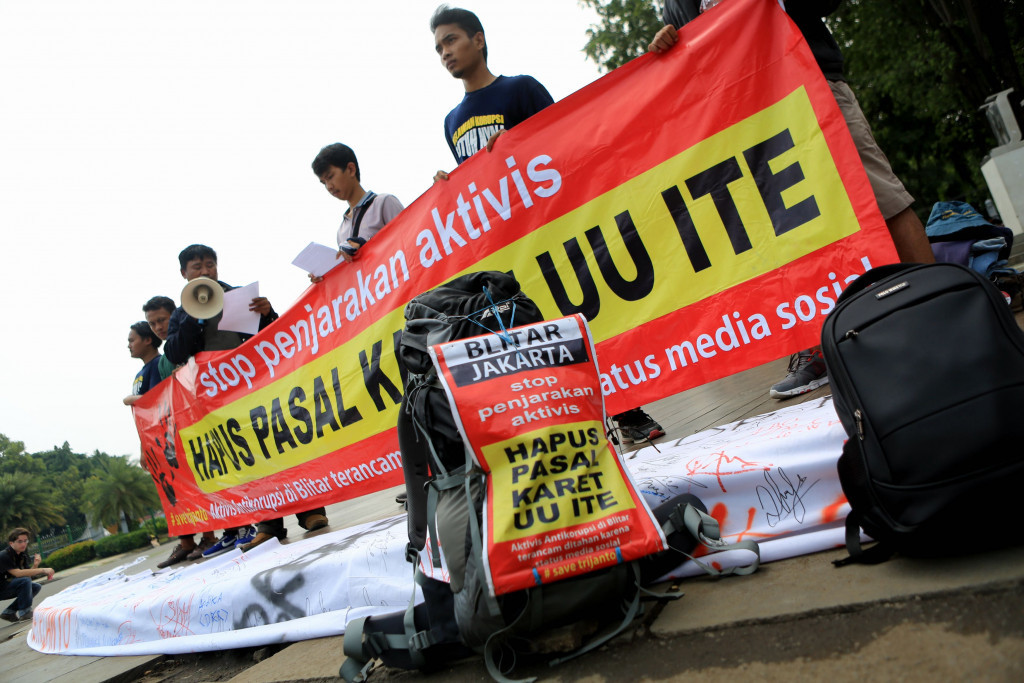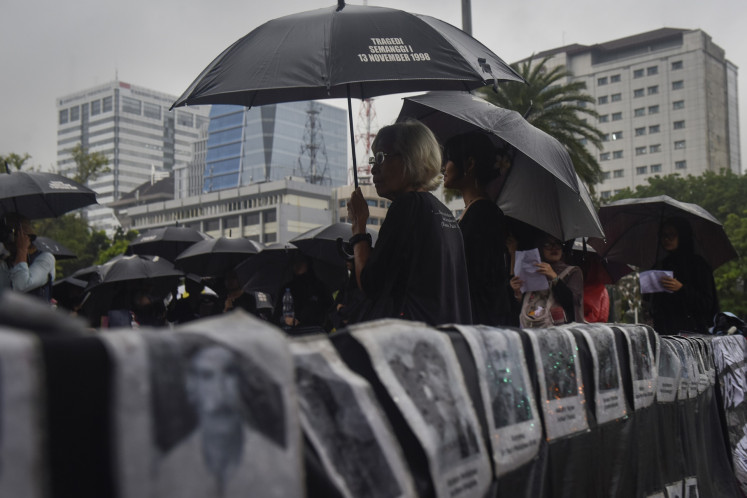Popular Reads
Top Results
Can't find what you're looking for?
View all search resultsPopular Reads
Top Results
Can't find what you're looking for?
View all search resultsIn a land of euphemism, speaking plain language is a heroic act
At the turn of the millennium, Indonesian regained its potency after being reclaimed by students, activists and opposition figures.
Change text size
Gift Premium Articles
to Anyone
I
ndonesians surely are familiar with the term "bahasa menunjukkan bangsa", which roughly translates into "language represents a nation".
Indonesian, derived from a regional language used in some parts of Sumatra was chosen by the country’s founding fathers as the national language, not only due to its simplicity but also for its egalitarian tendency.
The late Indonesianist Ben Anderson called Indonesian a language of revolution, as it was the revolution that imbued it with the "emotionally resonant words which give any language its cultural identity and aura, and which seem to express its speakers' most intimate experience”.
Words like "rakyat" (people), "merdeka" (free), "perjuangan" (struggle) and "semangat" (spirit) came straight out of the revolutionary fervor that drove the country’s independence and then became the battle cry of the country’s slightly leftist political tendency at that moment.
But just like any revolution, there was bound to be a backlash.
When the New Order regime arrived on scene, it did not take long for Indonesian to lose its edge. And anytime an authoritarian regime comes to power, the first casualty will be truth and the language through which the truth is expressed.
A dyed-in-the-wool Javanese, then-president Soeharto opted to use symbolism and euphemism when speaking Indonesian and treated the language as what ethnographer James Siegel described as a “formal language which lacks substance or intent”.
Soeharto certainly preferred to treat Indonesian like the high Javanese (kromo) described by Siegel as “using the language appropriate to one’s listener and to please, or at least not to upset the listener.”
In the words of the New Order regime, banks were not liquidated but rather its “enterprise had to be halted”. Political prisoners were not jailed, instead they were given “guidance at a rehabilitation center” and also poverty did not exist, as the poor were only in the state of “pre-prosperity”.
More than 20 years after Reformasi, today we certainly have the political freedom people living under the New Order regime could imagine we have.
At the turn of the millennium, Indonesian regained its potency after being reclaimed by students, activists and opposition figures who used words like “lawan” (fight), “demo” (demonstration), “mundur” (resign), “turun” (step down) as a battle-cry to unite people to stand against the ancient regime’s oppression.
Those words continue to be used to today whenever there is a move by politicians to reverse the gain from Reformasi. In fact, there are some new additions to the language like “reformasi dikorupsi,” (reform corrupted), “berani jujur hebat” (to dare to be frank is great), “tolak oligarki” (against oligarchy) and “mosi tidak percaya” (vote of no confidence).
Yet, old habits die hard.
In recent years, as the government is confronted with multiple problems from corruption, security problems and as of late the COVID-19 pandemic, things that are too difficult to be swept under the rug, the good old euphemism started to creep back in.
As it became obvious that the Corruption Eradication Commission (KPK) was being dismantled from the inside, essentially proving the point of “reformasi dikorupsi,” the government insisted that the purge against top KPK investigators was conducted to promote “wawasan kebangsaan” (national vision), whatever those words might mean.
And it was certainly not without thorough consideration that the government gave the rebel groups in Papua a designation like “kelompok kriminal bersenjata” (armed criminal gang) to refer to a separatist movement.
In the fight against the coronavirus pandemic the government has spent so much time debating semantics for what should be a straightforward lockdown policy.
Early in the pandemic, the word “lockdown” apparently spooked government officials so much that they advised against the use of such drastic language and told the public to use terms like “large-scale social restrictions” (PSBB).
It is now difficult to keep track of how many phrases government officials have used to describe what is essentially the same thing, from “transitional large-scale social restrictions” and “micro-scale public activity restrictions”, to “targeted restrictions”.
Things are dire and urgent attention is needed, yet the authorities are debating over what language sounds the least upsetting, essentially fiddling while Rome is burning.
Young students from the University of Indonesia Student Executive Body (BEM-UI) were trying to break this spell when they criticized President Joko "Jokowi" Widodo by using the plainest language they could find.
We can certainly debate their choice of using the English phrase “king of lip service” but we must admire the courage not only to speak to power but also to get to the heart of the problem of obfuscation and distraction through language.
The use of more euphemism under the Jokowi administration and the UI students’ effort to counter it certainly calls to mind one of the most crucial expositions in Siegel’s book Solo in the New Order: Language and Hierarchy in an Indonesian City about use of high Javanese prevalent in the city. (It certainly looks like a coincidence that Jokowi served two terms as mayor in this Javanese town).
In the book, Siegel points to the fact that speakers of high Javanese must employ a tone that is “pleasing, cajoling and without sharp edges”, and that this type of language is often conflated with the literary language still used in shadow-puppet performance.
Students at BEM-UI refused to treat politics as theater and they used the best vocabulary in their arsenal to cut through the noise and break the language barrier.
That is nothing short of heroic, because in a land when everyone is speaking in a low whisper, using your normal register certainly feels like a shout.
***
The writer is editor-in-chief of The Jakarta Post.










